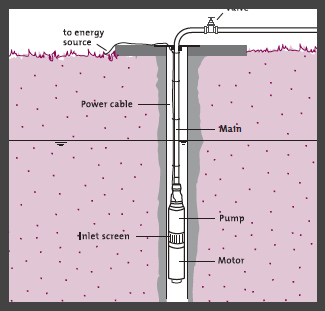Submersible pump
For deep-well applications, centrifugal pumps are housed with the electric engine in a single unit that is designed to be submerged. Usually, a multiple-stage pump is used. The multiple-stage pump is placed above a motor and under a check valve that leads to the rising main. Submersible pumps are self-priming, if they do not run dry. To prevent the pump from running dry, the water level in the well must be monitored, and pumping must be stopped if the water level drops to the intake of the pump.
Power is delivered through a heavily insulated electricity cable connected to a switch panel at the side of the well. The power may come from an AC mains connection, a generator, or a solar power system.
Suitable conditions
Range of depth: 7–200 m or more.
Efficiency range: 40–70%.
Trademarks: Guinard; Goulds; Grundfos; KSB; Meyers; and others.
